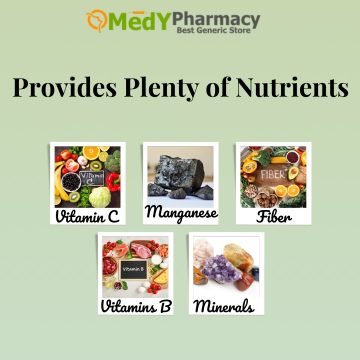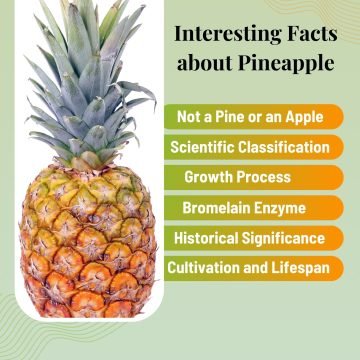Introduction:
Many people eat pineapples, which are widely accessible tropical fruits. On hot summer days, we prefer to savor its sweet and somewhat tart flavor. A pineapple juice or smoothie is the perfect way to stay cool on hot summer days.
However, let’s learn more about this tropical fruit’s health advantages than just its flavor. In this article. Grown all over the world, this tropical fruit is being researched for its use in the treatment of inflammation, discomfort, and digestive issues, among other ailments.
A key enzyme and bioactive substance in pineapple, bromelain has been shown to have anti-inflammatory and other health effects.
Nutrients and healthy substances like bromelain, which may strengthen immunity and enhance digestion, are included in this. This tropical beverage is well-liked.
The fruit and its juices are used in many cultures as a traditional folk treatment to prevent or treat a variety of illnesses.
Pineapple juice and its constituents have been linked in recent studies to several health advantages, including better heart and digestive health, less inflammation, and maybe even some cancer prevention. Not all of the evidence has been definitive, though.
This tropical fruit is well-known for its luscious sweetness and flavorful depth. Vitamin C, which strengthens immunity and supports good skin, is one of the many vitamins, minerals, and antioxidants that are abundant in it.
Similar advantages are provided by this, which promotes hydration and helps with digestion by using the natural enzyme bromelain. Consuming it regularly can also help lower inflammation, strengthen the heart, and add a nutritious, revitalizing element to your diet.
This tropical fruit is not only tasty, but it also has several health advantages. According to studies, folk medicine has been using it since ancient times.
For Americans, this is a year-round choice because it is available in fresh, frozen, canned, and dried forms. Convenient as canned pineapple is, make sure you choose one that is packaged in its natural juices instead of syrup to prevent additional sugar.
You should start including pineapple in your diet for its health advantages if you haven’t already, regardless of how you choose to consume it: grilled, fresh, frozen, or mixed in a smoothie.
What is Pineapples?
Known for its distinctive form, this tropical fruit has a tuft of spiky green leaves on top of a spherical of delicious, sweet flesh encased in thick, segmented skin. A group of blooms, each with its eye fused around the central core, make up the fruit, which takes an astounding 3 years to develop.
These tropical fruits are renowned for having a tart and sweet taste. The plant species Ananas comosus, which is a member of the Bromeliaceous family, produces these tasty fruits. Pineapples feature a fibrous, delicious pulp that varies in color from pale yellow to deep gold when mature, and a rough, prickly outer peel.
They are often consumed raw, but they may also be used in baking, cooking, and drinks like juices and piña coladas. Bromelain, an enzyme thought to have anti-inflammatory qualities, vitamin C, and manganese are all found in pineapples.
Antioxidants, vitamins, and minerals are abundant in this. The immune system, digestion, skin health, and more are some of the potential health advantages of pineapple juice.
This has been used as an old home treatment for inflammation and digestive problems for a long time.
Researchers have also investigated its possible immune-boosting properties and its capacity to speed up the healing process.
The advantages of pineapple juice are discussed in this article, along with certain safety measures that consumers should follow.
Provides Plenty of Nutrients
This has a lot of vitamins and minerals but little calories.

- Vitamin C
You will receive around one-third of the daily required dose of vitamin C, which is essential for tissue development and repair. Vitamin C may help prevent cancer, heart disease, and arthritis in addition to strengthening your immune system.
Ascorbic acid, another name for vitamin C, is an important nutrient that is responsible for preserving your health. Because of its potent antioxidant qualities, it is well recognized for shielding cells from harm brought on by free radicals. In addition to being essential for tissue development and repair, vitamin C aids in the body’s absorption of iron from plant-based diets.
Apart from strengthening the immune system, this is essential for the synthesis of collagen, a protein that maintains the health of skin, cartilage, tendons, ligaments, and blood vessels. It also has a role in the general health of the skin and wound healing.
- Manganese
This vital trace element is present in pineapple over 100% of the daily required level. Manganese supports immunological response, metabolism, and bone production.
One vital trace mineral that is crucial to many bodily functions is manganese. Blood clotting factors, sex hormones, connective tissue, and bones are all formed by it. Several enzymes involved in metabolism, the breakdown of lipids and carbohydrates, and nutrient absorption also require manganese as a cofactor.
Antioxidant defense is one of its most significant roles. This is a component of the enzyme superoxide dismutase (SOD), which neutralizes dangerous free radicals to help shield cells from oxidative stress.
Manganese, found in pineapples, is essential for healthy bones, wound healing, and general metabolic processes. Nuts, seeds, whole grains, and leafy green vegetables are other foods that are high in manganese.
- Fiber
One cup of pineapple provides over 10% of your daily fiber requirements. Fiber is important for intestinal health and can help you avoid hunger.
Even though the body cannot digest fiber, it is a necessary component of a balanced diet. It’s an important kind of carbohydrate that promotes healthy digestion and general well-being. Both the soluble and insoluble forms of fiber offer special advantages.
In addition to promoting better blood sugar regulation, particularly for diabetics, fiber can assist in maintaining regular bowel movements and reduce the risk of chronic illnesses like heart disease.
In addition to aiding with digestion, pineapples contain both soluble and insoluble fiber, which can prolong feelings of fullness. Whole grains, berries, avocados, beans, and lentils are other foods high in fiber.
- Vitamins B
A pineapple provides a good amount of vitamin B, such as folate, thiamin, niacin, and B6. These nutrients aid in the body’s energy processing from diet. The production of new red blood cells, which transport oxygen to your organs and tissues, also depends on them.
The B vitamins are a class of water-soluble vitamins that are essential for brain function, energy generation, and the metabolism of proteins, lipids, and carbohydrates.
Vital for the production of red blood cells as well as cell development and division. During pregnancy, it is particularly crucial. Well-known for promoting healthy skin, hair, and nails as well as aiding in the metabolism of proteins, fats, and carbs.
Numerous B vitamins, including folate and B6, are found in trace levels in pineapples. Folate is essential for DNA synthesis and cell development, whereas vitamin B6 is critical for metabolism and brain function.
Consuming a range of foods, such as dairy, eggs, leafy greens, and whole grains, will help guarantee that you obtain adequate amounts of these vitamins.
- Minerals
A pineapple includes copper, potassium, and magnesium, among other minerals your body needs to function properly.
Small quantities of these vital nutrients are necessary for the body to operate correctly. They are essential for things like neuron and muscle function, bone health, hydration, and general metabolic activities. The 2 primary types of minerals are trace minerals and macro minerals.
Manganese is one of the essential elements found in pineapples, and it is involved in metabolism, antioxidant protection, and bone building. Additionally, their potassium content is lower, which aids with fluid balance and muscular performance.
Eating a range of fruits, vegetables, whole grains, nuts, seeds, dairy products, and lean meats will help you receive a variety of minerals.
A Completely Nutritious Food Product
Avoid becoming overpowered by pineapples’ sweet and delectable flavor. It is quite nutrient-dense for your wellness as well.
The high-calorie content in pineapples gives you a quick energy boost, according to nutritional research on the fruit.
In addition, it has important nutrients including manganese, vitamin B6, copper, thiamine, folates, magnesium, potassium, riboflavin, iron, fiber, and vitamin C.
With such a favorable nutritional composition, Super P Force is also beneficial to men’s health. Don’t forget that this tropical fruit item contains necessary amounts of calcium, zinc, and phosphorus.
Antioxidants that guard against the damaging effects of free radicals are also present in it.
An ideal food product would have a balanced mix of macronutrients and micronutrients, as well as enough water and fiber, to be fully nutritious. No one item is “perfect” in and of itself, although certain foods are very near to being extremely nutrient-dense and good for your general health.
Due to their higher fiber content, sweet potatoes are great for intestinal health. They also have a lower glycemic index than ordinary potatoes, which helps with blood sugar regulation.
Because they contain good fats and can lower inflammation, avocados are great for heart health. Moreover, because of their fat content, they might enhance nutrition absorption and encourage fullness.
Rich in antioxidants, berries can help combat oxidative stress and inflammation. Additionally, they can enhance memory and promote brain health.
These foods can be combined to make a nutrient-dense, well-balanced diet that includes a variety of vitamins, minerals, and other vital components. These “superfoods” can help you acquire most of what you need for good health in a diversified diet.
Health Benefits of Pineapple
- High Seas
“High Seas” describes the enormous stretches of ocean that are not governed by any one nation. Although these seas are free for all nations to fish in, utilize for a variety of purposes, and navigate, they are also governed by international law, which seeks to guarantee their responsible use.
Despite being subject to international rules and regulations, nations are allowed to fish, sail ships, and install cables or pipelines on the High Seas. Fish species, coral reefs, and deep-sea life are among the many ecosystems that call the High Seas home. Protecting these regions from pollution, overfishing, and other dangers is the main goal of international accords.
Manganese
Manganese is a chemical element. This metal has several applications in industry and is necessary for several biological functions.
In its pure state, manganese is very reactive and brittle, but it greatly strengthens materials when alloyed with other metals, such as steel. It’s an essential part of making stainless steel and is also used in making batteries, such as those found in electric cars.
Despite our little requirement for it, manganese is also beneficial to our health. It aids in blood coagulation, metabolism, and bone production. Leafy greens, nuts, and seeds are among the foods that contain it.
- Vitamins
Vitamins are organic substances necessary for regular bodily development and operation.
Every vitamin has a distinct function in preserving health, and a balanced diet provides us with them. Vitamins must be obtained through food or supplements because most of them are not produced by our bodies. Supports healthy skin, the neurological system, and digestion.
Essential for the synthesis of DNA, red blood cell formation, and neuron activity. A vitamin that strengthens the immune system and facilitates iron absorption.
- Digestion
What a fascinating process digestion is! To obtain nutrients and energy from the food we eat, our bodies use this process. From the time food enters the mouth until waste is removed from the body, the process involves both mechanical and chemical food breaks.
Most of the digestion of chemicals takes place in the stomach. It produces digestive fluids that contain hydrochloric acid and protein-breaking enzymes like pepsin.
The mechanical activity of the stomach churns the food, combining it with acids and digestive enzymes to form chyme.
- Antioxidants
A balanced diet is the greatest way to obtain antioxidants, however, for people who might be deficient in some areas, supplements are available. Before beginning any supplement program, it’s wise to speak with a healthcare professional because excessive amounts of some antioxidants can be harmful.
All things considered, antioxidants function as the body’s defense mechanism, always guarding against cellular damage and being vital to overall health. Antioxidants help slow down the aging process of cells by lowering oxidative stress, which results in healthier skin and maybe less noticeable wrinkles and fine lines.
- Anti-Inflammatory
Chronic inflammation is connected to several illnesses, including cancer, heart disease, and arthritis. Anti-inflammatory drugs are excellent for treating chronic inflammation and preserving general health. Although inflammation is the body’s immune system’s normal reaction to damage, infection, or negative stimuli, persistent inflammation can lead to issues.
The body uses inflammation to defend itself and aid in the healing process. However, chronic or severe inflammation can cause tissue damage and play a role in the onset of illness.
There are substances in these spices that can stop inflammatory processes. For instance, it has been demonstrated that cinnamon lowers levels of pro-inflammatory cytokines, while cayenne’s capsaicin can decrease inflammation.
- Post-Workout
Your body must recuperate and rebuild muscle tissue, restore energy reserves, and lessen any discomfort or inflammation brought on by the physical activity after a workout. A healthy diet after exercise is essential for promoting this healing process.
Exercise raises the body’s oxidative stress levels, which can lead to inflammation and muscle damage. Antioxidants aid in the healing process by scavenging free radicals.
Eating your post-workout meal 30 to 60 minutes after working out is the ideal time frame. At this point, your body is ready to rehydrate, mend muscle, and restore glycogen reserves. If you can’t eat a whole meal at once, a protein shake or short snack will tide you over until you can eat again.
- Allergy
Allergies are a reaction of the immune system to normally safe chemicals that make the body react as though they are dangerous. A person with an allergy experiences minor to severe symptoms as a result of their immune system overreacting to an allergen.
Environmental reactions to things like mold, dust mites, or pet dander. Sneezing, coughing, and wheezing are among the symptoms that are frequently caused by these respiratory disorders.
When the same allergen is encountered again, the IgE antibodies cause immune cells to produce substances like histamine. Itching, swelling, and mucus production are just a few of the allergy symptoms that are caused by histamine.
Avoiding allergens, using medicine to reduce symptoms, and, in certain situations, receiving treatments like immunotherapy are common ways to manage allergies, which arise when the immune system overreacts to innocuous chemicals. Since the intensity of symptoms might fluctuate, it’s critical to manage allergies proactively to avoid unpleasant or sometimes fatal responses.
Safety of Pineapple
Despite being usually harmless, certain persons may need to limit or stay away from pineapple. Although it is uncommon, allergies to pineapple or its bioactive component, bromelain, are conceivable. If you have an allergy to pineapple or bromelain, stay away from them.
If you experience itching, hives, or shortness of breath—all symptoms of a severe allergic reaction—get medical help right once. You may have adverse consequences from eating pineapple or bromelain even if you are not sensitive to them. If you have an excess, this can be particularly true.
- Nausea and vomiting
- Diarrhea
- Heart palpitations
- Upset stomach
- Loss of appetite
- Headache
- Muscle pain
- Dizziness
- Drowsiness
- Lethargy
If you are pregnant or nursing, use caution when eating bromelain. Bromelain’s safety during pregnancy and lactation is uncertain. There may be interactions between amoxicillin and bromelain.
Bromelain may interact with blood thinners, which is another worry, although further research is needed to validate this possibility.
For pineapple or bromelain, there can be extra safety measures and interactions. Consult your doctor before consuming pineapple or bromelain, particularly if you have a medical condition or are on any drugs.
Interesting Facts about Pineapple

- Not a Pine or an Apple
It is possible that the phrase “manganese pineapple” is a wordplay or a special nonliteral allusion. You’re probably searching for something that sounds like “manganese pineapple,” but it’s not an apple or pine.
Neither a pine nor an apple might be a fun suggestion or a riddle. Is there something you’re talking about that isn’t an apple or a pine but may be related to those terms?
Does this have something to do with another kind of fruit or plant, or maybe a phrase in biology, chemistry, or another discipline? If you’re looking for a particular response or context, let me know.
- Scientific Classification
Organisms are categorized hierarchically according to common traits in scientific categorization. We use this categorization system for plants like apples and pine trees, although they are only common names. They would be classified in a far more precise scientific manner.
Insinuating that something isn’t an apple or a pine, however, may indicate that you’re discussing plants that don’t belong to these groups but are yet a part of the greater plant kingdom. For instance, plants that are neither conifers nor rose-family fruits may be members of completely different phyla, families, or orders.
- Growth Process
The production of a single pineapple fruit might take up to three years. Only one pineapple is usually produced every season by each plant.
To summarize, the process of plant growth includes the germination of seeds, the growth of roots and shoots, and an emphasis on both vegetative and reproductive growth. How plants develop and mature is influenced by several internal and external variables.
- Bromelain Enzyme
Bromelain aids in the breakdown of protein molecules into smaller pieces since it is a protease enzyme. This enzyme serves several purposes in the body and the preparation of food.
Bromelain can aid in the breakdown of proteins, which can facilitate and enhance the digestion of meals, especially that which is high in protein. It is occasionally seen in supplements containing digestive enzymes. Because it increases the synthesis of immune cells like T-cells and phagocytes, bromelain may help strengthen the immune system. According to several studies, it could help the immune system by thwarting microorganisms or illnesses.
Supplements containing bromelain can be purchased as pills or powders. They frequently provide anti-inflammatory or digestive health advantages. The label’s instructions or a healthcare provider’s advice should be followed because the suggested dose might change.
- Historical Significance
The pineapple itself evolved to represent welcome and hospitality in many civilizations, especially in the Caribbean and portions of South America. It was believed to provide several health advantages, including calming effects on the stomach and digestive system, which contributed to its hospitality.
The effects of bromelain on several ailments, such as its capacity to inhibit the development of cancer cells and its function in immunological support, were investigated by researchers. The enzyme has maintained its prominence in complementary health practices due to its anti-inflammatory and antioxidant properties, despite conflicting clinical data.
Digestive qualities gained further recognition. It has evolved from a traditional medicine to a studied drug with a wide range of possible health advantages. As a source of bromelain, the pineapple itself has come to represent luxury, friendliness, and cross-cultural interaction.
- Cultivation and Lifespan
From planting to harvesting, pineapple production entails several crucial phases, and the plant itself has a brief lifespan in comparison to some other fruit crops. However, the peculiar growth circumstances of pineapples and their capacity to yield fruit quite fast in some areas make them intriguing. Let’s examine how pineapple plants are grown and how long they last.
In terms of soil nutrients, pineapples require little care; nonetheless, fertilizer is beneficial, especially for nitrogen, potassium, and phosphorus. Additionally, organic matter can improve soil quality.
Internal mechanisms in plants cause them to bloom, but they may also be artificially stimulated by exposing them to substances like ethylene or acetylene, which promote flowering.
A pineapple’s unique requirements for climate, soil, and water must be carefully considered during its growth and existence. Plants that bear fruit for two to three years are comparatively short-lived.
They are a crucial crop in global agriculture since they can be grown in many different nations, despite their need for a warm, tropical climate.
New plants are formed from the offsets or crowns of the original plant, and after the first harvest, the plant usually yields secondary fruits until being removed a few years later.
Is Eating Pineapple Harmful To Your Health?
It is uncommon for pineapples to cause allergies. In the absence of a documented pineapple allergy, eating them is regarded as extremely low risk. You should stay away from pineapple and its extracts in that situation.
However, consuming excessive amounts of pineapple—more than a few servings per day—may have unforeseen negative effects even in those without diabetes or allergies.
Itching, burning, or nausea are adverse effects that people who are sensitive to bromelain may suffer; however, they are anecdotal and have not been investigated academically.
Some claim that consuming a much of unripe pineapple might lead to diarrhea, nausea, and upset stomachs. Once more, there is no research on this, although it is always preferable to choose ripe pineapple. Light to medium golden skin is the ideal color.
Possible Safety Measures
Most people believe that pineapple juice is harmless.
However, pineapple juice contains a naturally occurring set of enzymes called bromelain, which may improve the absorption of several medications, including blood thinners and antibiotics.
Therefore, if you are on any medications, check with your doctor or trained nutritionist to see if pineapple juice is okay to ingest.
Some people may have reflux or heartburn due to the acidity of this beverage. People who have gastric reflux disease in particular might wish to limit their intake of this beverage.
Despite its possible advantages, it’s crucial to keep in mind that pineapple juice is still heavy in sugar and poor in fiber.
This implies that it is unlikely to provide the same level of fullness as consuming the same amount of raw pineapple. Therefore, it could encourage some people to acquire weight.
Furthermore, while consuming small amounts of juice has been associated with a decreased risk of heart disease and type 2 diabetes, consuming more than 5 ounces (150 mL) of juice daily may have the reverse impact.
As a result, it might be better to follow the dietary recommendations that state that you should only consume half of your daily fruit as juice. Additionally, always consume 100% pure juices without additional sugars.
Might Aid In the Treatment of Arthritis Symptoms
A very serious ailment that affects the joints and causes internal inflammation in many people is arthritis. Older adults are especially susceptible to arthritic problems.
The fruit’s potential to relieve pain is caused by the presence of the compound bromelain. According to other research, the fruit’s antioxidants can also treat inflammatory conditions.
General studies suggest that those who frequently eat pineapple apples may shield themselves against severe osteoarthritis, despite the lack of a definitive study report on the topic. Additionally, it could aid in the treatment of osteoporosis and other bone problems.
Ensures Rapid Pain Reduction
Are you experiencing frequent cramping in your muscles or injuries from overstressing your body? Pineapple may be the ideal fruit to treat these problems, according to studies. Its abundance of vitamins, antioxidants, and vital minerals like potassium and phosphorous make it an excellent remedy for muscular strains and cramps.
Regularly including a small quantity of watermelon in your diet can help avoid these problems, according to studies. According to an experiment, giving small amounts of pineapple juice daily to those who had experienced muscular cramps only temporarily resolved the problem.
Bromelain is frequently suggested as a supplement to help those with long-term inflammatory diseases like rheumatoid arthritis or osteoarthritis by easing joint stiffness and discomfort. For quicker joint pain and discomfort alleviation, it could be used in conjunction with other therapies.
Because of its inherent anti-inflammatory qualities, it helps lessen the pain, stiffness, and swelling that come with injuries, arthritis, and soreness after an exercise. Whether taken as supplements or as a fresh pineapple, it can help reduce pain, particularly when paired with other therapies. It’s wise to speak with a healthcare provider before taking any supplements, though, particularly if you have underlying medical issues or are already on any drugs.
Because of its remarkable nutritional profile, pineapple is a great dessert, side dish, or anytime snack. There are only 75 calories in a cup, and it has no fat, cholesterol, or salt.
Pineapples are packed with nutrients that can improve your health, but some of their health claims require more research. Add this vibrant, tart fruit to your diet whichever you choose. You may slice, chunk, grill, or combine it.
Blended, roasted, sauteed, or raw, this fruit may be eaten on its own or in a variety of recipes. Check out Medypharmacy.
























